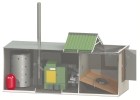Packaged biomass

The scope for pre-fabricated heating plant is changing, with the commercial Renewable Heat Incentive (RHI) driving the desire for low-carbon alternatives to fossil fuels. Biomass is one of the more recent technologies to be housed in a ‘plug-in and go’ package. Simon Holden of Euroheat explains its benefits to wood-fuelled heating.
Installing a biomass heating system is pricey. It can take weeks to install, and with many of our customers living in listed properties, there can be issues with planning permission. Sounds like I’m putting a downer on my own business.
I’m not.
Wood heating, in the traditional format, is a great solution for many people, especially those switching from oil who have access to managed woodland. With the RHI on top of savings made on bills, payback is generally within three to eight years, and the bespoke nature of this approach means boiler rooms can be designed to be sympathetic to their surroundings — for example, utilising an old barn, or building a structure in keeping with others around it.
What biomass ‘energy cabins’ or prefabricated heating plant offer is a much faster and cheaper solution, up to a 30% reduction in costs, for projects where the requirement is needed quickly, particularly those where planning may be an issue. We’re talking days instead of weeks for installation, drastically cutting manpower and time spent on site, making this solution ideal for public-sector retrofit projects where premises can’t be closed for a long period of time — such as schools and hospitals. And, with the ‘box’ considered a non-permanent structure, it can avoid planning legislation all together.
One of the key benefits of pre-fabrication is that the system is put together by the ultimate product experts, improving quality control, and arriving on-site part-commissioned and ready to be plumbed-in and wired up by a competent M&E operative. This helps to reduce the danger of installation errors. With a single source of supply, engineers fitting pre-fabricated products don’t need to worry about ordering parts.
Once on-site there is no issue of work being way-laid because of external forces such as the weather, or the building to which the heating system is being installed not being completed.
For end-users who don’t have an old barn kicking around and don’t have the budget to build a structure specifically for the biomass system, an energy cabin is ideal. Customers replacing oil heating will be used to the bulk of equipment; where this went, the energy cabin can go. Due to its modular design, these pre-fabricated units can provide heating capacities from 15 to 950 kW, covering domestic through to commercial projects.
A perfect application for a modular energy cabin scheme would be district heating on a trading estate, especially one where waste wood is generated by the businesses. In this case, an external chip hopper could act as a useful recycling tool, keeping heating costs right down.
We’ve designed our pre-fabricated plant rooms to be delivered on-site using a flat-bed lorry, so no need for vehicle escorts. Apart from the fact this is a renewable system, transport of a complete unit has far less environmental impact than multiple deliveries, plus there is less risk of parts going missing.
Pre-fabricated plant is often housed inside old shipping containers, but we decided to build our own out of steel, pre-insulated panels. These units are bespoke, created specifically for the task in hand to provide easy access for customers and servicing engineers. This approach also allows more flexibility when it comes to design and guarantees strength, rigidity and longevity.
The wall and roof panels are supported by an 80 mm box-section framework. Panels provide several functions: weather proofing, additional strength; insulation for maximised efficiency; and an attractive clean appearance for industrial purposes. Alternatively, the cabin can be clad in wood — ideal for blending in with rural settings and in keeping with the system’s fuel!
With all manner of system configurations available, the biomass energy cabin should appeal to a broad range of customers, making something that has traditionally been a fairly drawn-out process into a quick solution that can be turned around in a day.
Simon Holden is co-founder of Euroheat.







